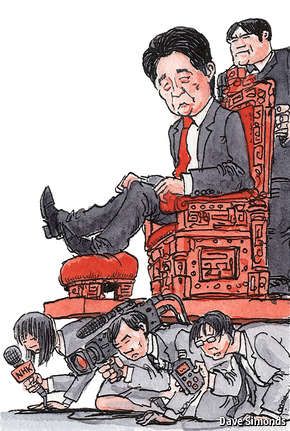http://www.asyura2.com/15/senkyo185/msg/231.html
| Tweet |
Speak no evil
見猿、聞か猿、言わ猿
Japan’s media are quailing under government pressure
日本のメディアは政権の圧力の下で恐怖におののく http://t.co/2Zzm2pY3e4
"The Economist"
— 赤旗政治記者 (@akahataseiji) 2015, 5月 18
The media in Japan
http://www.economist.com/news/asia/21651295-japans-media-are-quailing-under-government-pressure-speak-no-evil?fsrc=scn/tw_ec/speak_no_evil
 WITH a weak opposition, an election in the bag and buoyant approval ratings, the government of Shinzo Abe, Japan’s prime minister, would hardly seem to have much to fight against. Yet it is waging an increasingly heavy-handed campaign to intimidate the media. Even pro-government journalists are crying foul.
WITH a weak opposition, an election in the bag and buoyant approval ratings, the government of Shinzo Abe, Japan’s prime minister, would hardly seem to have much to fight against. Yet it is waging an increasingly heavy-handed campaign to intimidate the media. Even pro-government journalists are crying foul.Discreet interventions by politicians have long been customary. But bullying recently broke into the open when a bureaucrat turned political gadfly, Shigeaki Koga, accused the government on a television show of strong-arming the media by securing his removal from “Hodo Station”, a news show owned by TV Asahi, a liberal broadcaster. The ruling Liberal Democratic Party (LDP) promptly proved Mr Koga’s point by grilling the programme’s producers over the outburst under the auspices of Japan’s broadcast law.
That brought the LDP close to overstepping the law’s guarantees of freedom of expression, media scholars say. Other recent cases of muzzling the media include thinly veiled threats over broadcasters’ licences. Last autumn the LDP demanded fair and neutral reporting on the snap general election in December. Many Japanese thought the election a waste of time and money. Television channels cut back their coverage. Not coincidentally LDP—which is able to get out its core voters and does better on low turnouts—won easily.
Mr Abe has objected to television interviews in which ordinary people say that his economic schemes are not helping them, though such a perception is common. Personnel changes at Japan’s main broadcasters are now routinely rumoured to be down to government pressure. Even foreign journalists complain that diplomats try to steer their reporting.
The long-term aim may be a broad reshaping of the media. While the LDP was out of office in 2009-12, it blamed the media for its humbling by the opposition Democratic Party of Japan. Today Mr Abe’s cherished aim is to revise Japan’s constitution, written seven decades ago by the Americans, in which Japan renounces war as a sovereign right. Shifting the public away from its deeply held pacifism would require broad media backing, or at least for criticism to be muted.
A particular target is NHK, the state broadcaster. The government also summoned executives from “Close-up Gendai”, a hard-hitting current-affairs programme, to answer for minor flaws. The broadcaster’s newish director-general, Katsuto Momii, a friend of Mr Abe, last year declared an intent generally to hew more closely to the government line. The LDP also cheered the departure in 2013, for family reasons, of Monta Mino; his forthright guests used daily to skewer the ruling party on television, says Michael Cucek of Sophia University.
The assault on broadcasters accompanies pressure on the most forceful of the establishment-minded big daily newspapers, the Asahi Shimbun, sister paper to TV Asahi. Last autumn the government and conservative media outlets savaged it for its admission that some of its reporting on the imperial army’s wartime use of sex slaves had relied on false testimony. The broad historical facts are not in doubt, yet journalists say that inside theAsahi it is now hard to write about the issue at all. The paper’s political reporters are often too cowed even to ask questions at government press conferences, rivals say.
Mr Abe would never go so far as to yank a broadcast licence, says one LDP politician, for that would smack of authoritarian government and prompt retribution at the ballot box. Yet there seems plenty of scope to encourage timidity. A new law on state secrets that could send journalists to prison for receiving leaked information will presumably dampen investigative appetites. In a global ranking of media freedom by Reporters Without Borders, a Paris-based watchdog, Japan now comes 61st, a fall of 50 places in just five years.
投稿コメント全ログ コメント即時配信 スレ建て依頼 削除コメント確認方法
▲上へ ★阿修羅♪ > 政治・選挙・NHK185掲示板 次へ 前へ
 スパムメールの中から見つけ出すためにメールのタイトルには必ず「阿修羅さんへ」と記述してください。
スパムメールの中から見つけ出すためにメールのタイトルには必ず「阿修羅さんへ」と記述してください。すべてのページの引用、転載、リンクを許可します。確認メールは不要です。引用元リンクを表示してください。